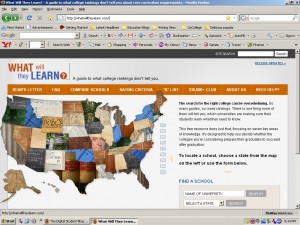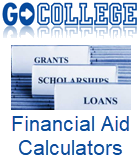The College Search Process – WhatWillTheyLearn.com Takes Different Approach
Students searching for the right college have a variety of sources available that help provide advice during the selection process. In recent years, a good many individuals have come to rely upon the U.S. News and World Report for its well-known college ratings guide.
However, incidents involving questionable reporting by the University of Southern California and the suggestion by folks at Clemson that the U.S. News data can be manipulated have raised concerns with the accuracy of the information provided by this publication.
So it is not too surprising to see the launch of a new site, WhatWillTheyLearn.com, which seeks to provide some additional information about the college landscape.
Interesting Focus
Touted as a guide to provide insight that other rankings and college guides fail to address, WhatWillTheyLearn attempts to determine the schools that “are making sure their students learn what they need to know.” Suggesting that most colleges and universities are using a do-it-yourself curriculum approach, a process leading to graduates “with a thin and patchy education,” the free website is designed to help parents and students determine which “colleges are preparing their graduates to succeed.”
To determine which universities are making sure their students learn what they need to know, institutions are rated on seven key areas of knowledge.
Former Harvard Dean Harry Lewis represents the public face of the site. He notes that the requirements that colleges impose, though specifically designed to make sure students receive a well-rounded education, are actually very misleading.
 Lewis notes: these requirements “often simply call for one course in the humanities, one course in social science, and so on.” Unfortunately, according to Lewis, “On some campuses, it doesn’t matter at all what courses are chosen, as long as they are in the right categories. Other schools limit the courses so that they meet some special criteria, but there is little sense of how each individual course relates to the others.”
Lewis notes: these requirements “often simply call for one course in the humanities, one course in social science, and so on.” Unfortunately, according to Lewis, “On some campuses, it doesn’t matter at all what courses are chosen, as long as they are in the right categories. Other schools limit the courses so that they meet some special criteria, but there is little sense of how each individual course relates to the others.”
Lewis is not pleased with this development and goes on to add, “This is deplorable … at its best, general education is about the unity of knowledge, not about distributed knowledge. Not about spreading courses around, but about making connections between different ideas. Not about the freedom to combine random ingredients, but about joining an ancient lineage of the learned and wise. And it has a goal, too: producing an enlightened, self-reliant citizenry, pluralistic and diverse but united by democratic values.”
As for one very specific example of the hodge podge nature of college curricula on college campuses, Lewis touts the studies that reveal many “college graduates are ignorant of the basic principles on which our government runs.” According to Lewis, it is easy to understand why “most cannot identify the purpose of the First Amendment, what Reconstruction was, or the historical context of the Voting Rights Act.
“The vast majority of our colleges have made a course on the broad themes of U.S. history or government optional. This is especially dangerous in America, where nothing holds us together except our democratic principles.”
Grading System Used
WhatWillTheyLearn focuses on a couple of pieces of information often provided in other catalogs including how much schools will be charging and how many of their students earn a degree. But the site also provides information on what a college will expect graduates to study outside their majors.
Essentially, to determine the state of a respective school’s general education program, WhatWillTheyLearn examines whether or not a school requires seven key subjects: English composition, literature, foreign language, U.S. government or history, economics, mathematics, and science. These are subjects, according to the website, that have become “mere options on far too many campuses.”
 To provide a rating for a school, WhatWillTheyLearn looks at very specific course elements. For example, in Composition, the expectation is an introductory college writing class focusing on grammar, style, clarity, and argument. For Literature, the expectation is a course featuring a broad comprehensive literature survey and cannot be simply “narrow, single-author, or esoteric courses.” In the area of Foreign Language, there is a demand for demonstrated “competency at the intermediate level, defined as at least three semesters of college-level study in any foreign language.”
To provide a rating for a school, WhatWillTheyLearn looks at very specific course elements. For example, in Composition, the expectation is an introductory college writing class focusing on grammar, style, clarity, and argument. For Literature, the expectation is a course featuring a broad comprehensive literature survey and cannot be simply “narrow, single-author, or esoteric courses.” In the area of Foreign Language, there is a demand for demonstrated “competency at the intermediate level, defined as at least three semesters of college-level study in any foreign language.”
For U.S. Government or History, the expectation is a “survey course in either U.S. government or history, with enough chronological and topical breadth to expose students to the sweep of American history and institutions” while “narrow, niche courses do not count for the requirement, nor do courses that only focus on a narrow chronological period or a specific state or region.” In the field of Economics, the requirement is an introductory course covering basic economic principles in micro- or macroeconomics and to be valid it must be taught by faculty from the economics or business departments.
In Mathematics, the requirement is for a college-level course (advanced algebra, trigonometry, calculus, computer programming, statistics/probability, or mathematical reasoning at or above the intermediate level). And in the Natural or Physical Science field, the expectation is a college-level course in “astronomy, biology, chemistry, geology, physics, or environmental science, preferably with a laboratory component” (and must be taught by faculty from within the school’s science department).
Using these criteria, a school is assigned a grade based on how many of these seven subjects students are required to complete while earning their diploma (A: 6-7 core subjects required, B: 4-5 core subjects required, C: 3 core subjects required, D: 2 core subjects required, and F: 0-1 core subjects required).
Liberal Arts Proponent
Some may see the site as having a specific bias as it is sponsored by the American Council of Trustees and Alumni (ACTA), an independent, non-profit organization that was launched in 1995. According to their website, ACTA is “committed to academic freedom, excellence, and accountability at America’s colleges and universities” and to ensuring “that the next generation receives a philosophically rich, high-quality college education at an affordable price.”
That said, it must be noted that ACTA is a huge supporter of the liberal arts education model. Yet it is interesting to see a proposed model that does not demand a full liberal arts approach, just a more focused curriculum in the general education courses.
Since one can never have too much information, we suggest students check to see how the schools they are considering stack up on this new site. Again, this is not your U.S. News and World Report version (it was astonishing to see Bowdoin College receive an F). Just be forewarned, the site is still in the early stages with only 125 or so schools rated.


Non-traditional students have much more to contentthan traditional college-aged students. They have the demands of jobs to contend with as well as the stresses of trying to find financial aid that will allow them to attend college.
HELL NO I WORKED AT ONE TO GET MY SELF THROUGH NURSING SCHOOL A LOT OF TIMES THOSE PLACES GIVE THE JOBS TO ALL THERE FRIENDS SO GOOD LUCK IT DOES HELP TO HAVE SOME COSMETIC KNOWLEDGE. BUT IF YOU GONNA GO TO SCHOOL JUST GO ALL THE WAY AND CUT HAIR OR APPLY MAKEUP AT SOLONS.